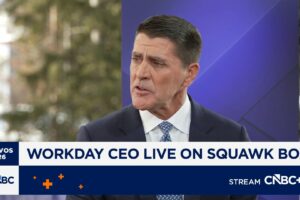Top Tech Wearables for Healthcare: Future Trends
Wearables are key in collecting large amounts of data and can easily be paired with software systems for analysis. Big tech companies such as Google (Alphabet) are developing algorithms that interpret large collections of data from wearable sensors.
GlobalData forecasts the wearable tech market to witness at a compound annual growth rate (CAGR) of 19% by 2023 to reach approximately $54bn in value.
Listed below are the leading tech companies for healthcare wearables, as identified by GlobalData.
Apple
Apple leads the market after entering in 2015 with its first smartwatch. They rapidly expanded into hearables with the Apple AirPods in 2016. Apple began AR smart glasses development in 2018 with the acquisition of Akonia Holographics. Apple is adopting newer technologies to drive operability of its devices, such as LTE capability on Apple Watches and Siri on Apple AirPods.
With the improvement in VR technologies and Oculus’s low-cost models gaining commercial prominence in Western countries, Facebook plans to sell a billion Oculus VR headsets globally. Facebook’s Oculus devices are successfully outpacing the nearest competitors, Sony PS VR and HTC VR devices.
Facebook’s in-house engineers are also working on a wearable band that can teach people how to feel words. Inspired by Braille and Tadoma, the band enables the wearer to “read” incoming smartphone messages in the form of vibrations.
Access the most comprehensive Company Profiles on the market, powered by GlobalData. Save hours of research. Gain competitive edge.

Your download email will arrive shortly
We are confident about the unique quality of our Company Profiles. However, we want you to make the most beneficial decision for your business, so we offer a free sample that you can download by submitting the below form
By GlobalData
Visit our Privacy Policy for more information about our services, how we may use, process and share your personal data, including information of your rights in respect of your personal data and how you can unsubscribe from future marketing communications. Our services are intended for corporate subscribers and you warrant that the email address submitted is your corporate email address.
Fitbit
Fitbit is a pioneer in wearable technologies. They offer a range of connected health and fitness devices. These include fitness and smartwatches, wristbands, activity trackers, and wireless headphones. The company offers a personalised online dashboard and mobile apps. These sync automatically with and display real-time data from wearable devices.
The company’s NFC-based payments service platform, Fitbit Pay, enables users to pay via credit or debit card through supported Fitbit smartwatches.
Garmin
Garmin offers a range of products designed for use in fitness and activity tracking. The company’s fitness trackers and ruggedised GPS smartwatches are marketed worldwide. Following the strategies of its peers, Garmin introduced the wearables payment platform Garmin Pay, and LTE enabled smartwatches. The company also offers Garmin Connect and Garmin Connect Mobile platforms for users to track, analyse, and share their fitness and wellness data. They can also compete with community members.
Google (Alphabet)
Despite being a front-runner in developing wearable technologies, Google encountered challenges in positioning its devices in the marketplace. The Google Glass failed to gather traction in the market. Similarly the Wear OS is often mentioned by smartwatch makers to be an underperformer when compared to Apple’s watchOS.
However, the Wear OS remains the preferred choice for numerous smartwatch OEMs. It is anticipated to undergo an overhaul when Google initiates the development of the long-awaited Pixel Watch. Meanwhile, Google re-introduced the Google Glasses Enterprise Edition in 2017, specifically targeting industrial applications.
HTC
The Taiwanese consumer electronics company stands as a leader in the VR sector. The company sold off its mobile manufacturing segment to Google, with plans to invest more aggressively in maturing their VR competencies. In partnership with Valve Corporation, HTC designed VR devices for Steam users. The Vive series VR headsets are directly competing with Facebook’s Oculus headsets in the global market.
Huawei
Huawei offers low-cost fitness trackers and smartwatches in the global wearables market. Within a period of three-four years since its foray in the wearables market, Huawei has excelled in blending wearable technologies with fashion attributes. The backward integration initiatives to develop its own smartwatch chips and OS reduced dependency on other vendors.
The latest Huawei Watch GT includes its custom silicon chips and features the Lite OS as a replacement of the Wear OS. Expanding its portfolio, Huawei’s initial collection of basic smart glasses, developed in collaboration with Korean brand Gentle Monster, is expected in the second half of 2019. AR-based smart glasses are set to be launched in 2020-2021.
Microsoft
Despite being an early entrant in wearables with the Microsoft Band, Microsoft’s present involvement in the sector is largely confined to smart glasses. While its competitors emphasised VR and AR, Microsoft went a step ahead to develop the Mixed Reality (MR)-based HoloLens and HoloLens 2.0, which the company is presently positioning more as an enterprise solution than a consumer product.
Absence of significant competition in the MR segment provides Microsoft with a strong position to benefit from the HoloLens devices. The company also holds patents for new fitness-focussed smart rings and bands.
Qualcomm
Qualcomm is involved in developing custom silicon chips for wearable devices, primarily for OEMs utilising the Google Wear OS. In September 2018, Qualcomm introduced its latest smartwatch chipset called the Snapdragon Wear 3100.
To establish this new chipset and expand the prominence of the Qualcomm Snapdragon Wear family of wearable platforms, it collaborated with original design manufacturers such as Compal Electronics and Longcheer on smartwatches. Huaqin and Thundersoft collaborated on 4G kids’ watches, Franklin Wireless on 4G smart trackers, and Smartcom on 4G connected end-to-end solutions. Qualcomm’s Wear 2500 is specifically designed to serve on kids’ watches.
Samsung
Samsung’s wearable portfolio includes smartwatches, smart fitness trackers, and VR headsets. Although its initial wearable devices were developed in association with other firms, the company gradually took control over the subsequent developments. Samsung eventually replaced the Android Wear OS with its own Linux-based Tizen OS and initiated developing its Exynos SoC microprocessors for its smartwatches. The company develops both software and hardware for VR devices all by itself.
Samsung has expanded into the hearables segment with the Samsung Gear IconX, which is presently in the second generation. It is aggressively positioning its smartwatches in enterprise applications and is also developing smart clothes, a less crowded segment that is gaining market traction.
Sony
Sony’s wearable offerings include smartwatches, activity trackers, and VR headsets. However, Sony’s technology integration has been significantly slower than other players in the market. The company’s PlayStation (PS) VR is primarily targeted to the gaming populace and works with the PS4 console.
Similarly, its SmartBand activity tracker series falls short of the latest healthcare-focused functionalities. However, Sony integrated calling capabilities in the activity tracker and relaunched it as SmartBand Talk. In 2019, Sony introduced the Sony Wena straps, which, when connected to a traditional watch, enables watch-based contactless payment, basic fitness tracking, and notification access from the connected phone.
Vuzix
Vuzix is an emerging brand in the wearables market, which offers display technologies and software products. In 2015, Intel acquired a 30% share of the company for $24.8m. Then in 2017 BlackBerry partnered with it to develop enterprise-specific smart glasses.
The company has also been a consistent promoter of smart glasses applications in enterprises. They supported DHL’s “Vision Picking” programme, and developed a customised Windows-based USB-C Type C AR smart glasses for Toshiba. The company is presently involved in the development of a waveguide-based HMD for use in US military aircraft.
Xiaomi
Xiaomi, often referred to as “the Apple of China”, is the leading wearables vendor in China. It holds strong command in multiple matured markets, including the US. The company procures wearable devices, especially smartwatches, from its exclusive technology partner, Huami. Its offerings also include the Mi Band fitness trackers. These which accounted for nearly one-quarter of the company’s shipments in Q4 2018.
The company is known for delivering high-tech devices at low prices. In the domestic Chinese market, Xiaomi’s rapid growth challenges the dominance of Huawei. Xiaomi is set to introduce new wearables in 2019. These are likely to feature Huami’s new Huangshan -1 chip that is capable of screening heart rate patterns of users via cloud-based AI.
This is an edited extract from the Wearable Technology in Healthcare – Thematic Research report produced by GlobalData Thematic Research.














